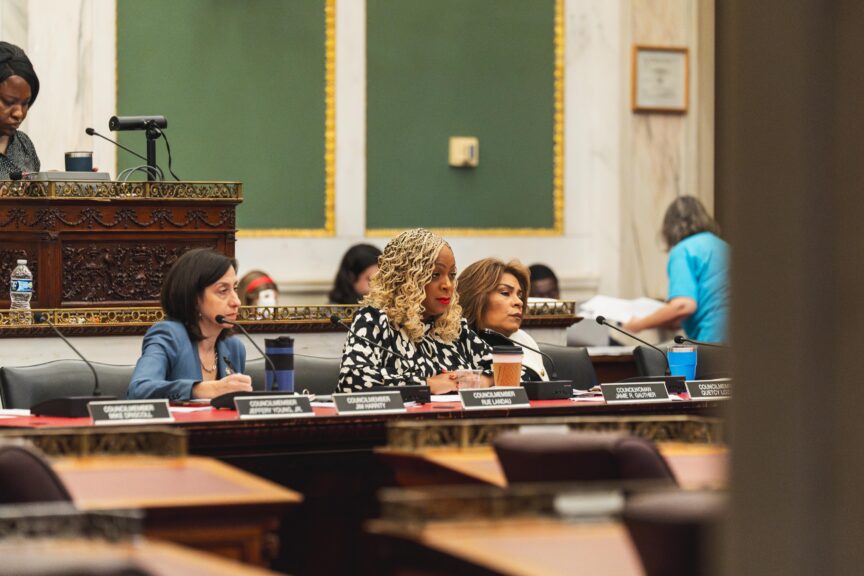PHILADELPHIA – Today, City Council’s Committee on Housing, Neighborhood Development, and the Homeless and Committee on Public Property and Public Works held a joint hearing on the Philadelphia Land Bank.
During the hearing, Councilmembers reviewed the Land Bank’s performance over the past decade. They also heard from stakeholders like nonprofit developers and community gardeners about changes the Land Bank needs to make so it can efficiently dispose of land for affordable housing and community gardens.
“To overcome our housing crisis we need to use our City-owned vacant land to build long term, genuinely affordable housing,” said Councilmember Jamie Gauthier, Chair of the Committee on Housing, Neighborhood Development, and the Homeless. “But we need an efficient, transparent, and driven Land Bank to accomplish this. It is past time for the Land Bank to take a hard look in the mirror and recommit to its founding mission of generating affordable housing and community green spaces.”
Councilmember Quetcy Lozada, Chair of the Committee on Public Property and Public Works said, “It is clear that the Land Bank is in need of major revisions and reforms but even more apparent that oversight is needed as well. This hearing was an important step in getting on the same page and I look forward to continued conversations between Council, the Land Bank, and the constituents that we both serve.”
Councilmember Rue Landau, Vice Chair of the Committee on Housing, Neighborhood Development, and the Homeless said, “As we review the performance of the Philadelphia Land Bank over the past decade, we must work to ensure it is properly functioning to accomplish its goals moving forward. I want to uncover opportunities to create more affordable housing and vital green spaces that our communities need to thrive. By rethinking how we use vacant land, we’ll create a more inclusive and sustainable Philadelphia, where every resident has access to both affordable homes and vibrant public spaces.”
Nonprofit and for-profit developers, community gardeners, neighborhood groups, and residents shared how land dispositions for community-minded end uses like community gardens and affordable housing are more the exception than the rule, and made it clear that the Land Bank fails to give neighborhood groups the support and transparency they need to acquire land for community uses.
Rick Sauer, Executive Director of the Philadelphia Association of CDCs said, “Today demonstrates that the vision of advocates for a Land Bank that is predictable, accountable, and transparent has yet to be realized. But vacant property is a critical — and finite — resource and one that we have an obligation to ensure is used as a tool to build a more equitable Philadelphia. We look forward to working with City Council and the Administration to build the Land Bank Philadelphians deserve.”
“The Land Bank has yet to reach its potential to preserve these vital resources despite the known benefits of community gardens to neighborhoods,” said Sari Bernstein, staff attorney at the Public Interest Law Center. “We are calling on the Land Bank to prioritize clearing the backlog of pending garden applications and engage with community members to find solutions that will improve its operations, including through stakeholder-informed strategic planning, revisiting its Acquisition and Disposition Policies, and complying with robust yearly performance reports.”
“We need the Land Bank to honor its commitments to effectively and efficiently work with community groups who are trying to improve their neighborhoods through stewardship of urban garden parcels,” said Mike Moran, Community Iglesias Garden.
Stakeholders gave the Land Bank several recommendations, including:
- Holding the Land Bank to its legal obligation to submit annual performance reviews to Council and publish a strategic plan every three years.
- Standardizing documents and the application process.
- Significantly improving customer service.
- Allowing neighbors apply for short-term garden leases and to create a property application process that is accessible to neighbors, not just developers.
- Dedicating staff members to specifically review garden applications.
- Emulating the speed of land disposition under City Council’s Turn The Key program.
Angel Rodriguez, Executive Director of the Philadelphia Land Bank, and Jessie Lawrence, Director of the City of Philadelphia’s Department of Planning and Development said the Parker Administration will work on a Land Bank strategic plan and submit the required performance report to Council by the end of the year. They also agreed with the need to improve transparency, marketing, and customer service and hire more staff.
Council will continue to review and reform the Land Bank until the agency fulfills its mandate to create affordable housing and community green spaces.
# # #


